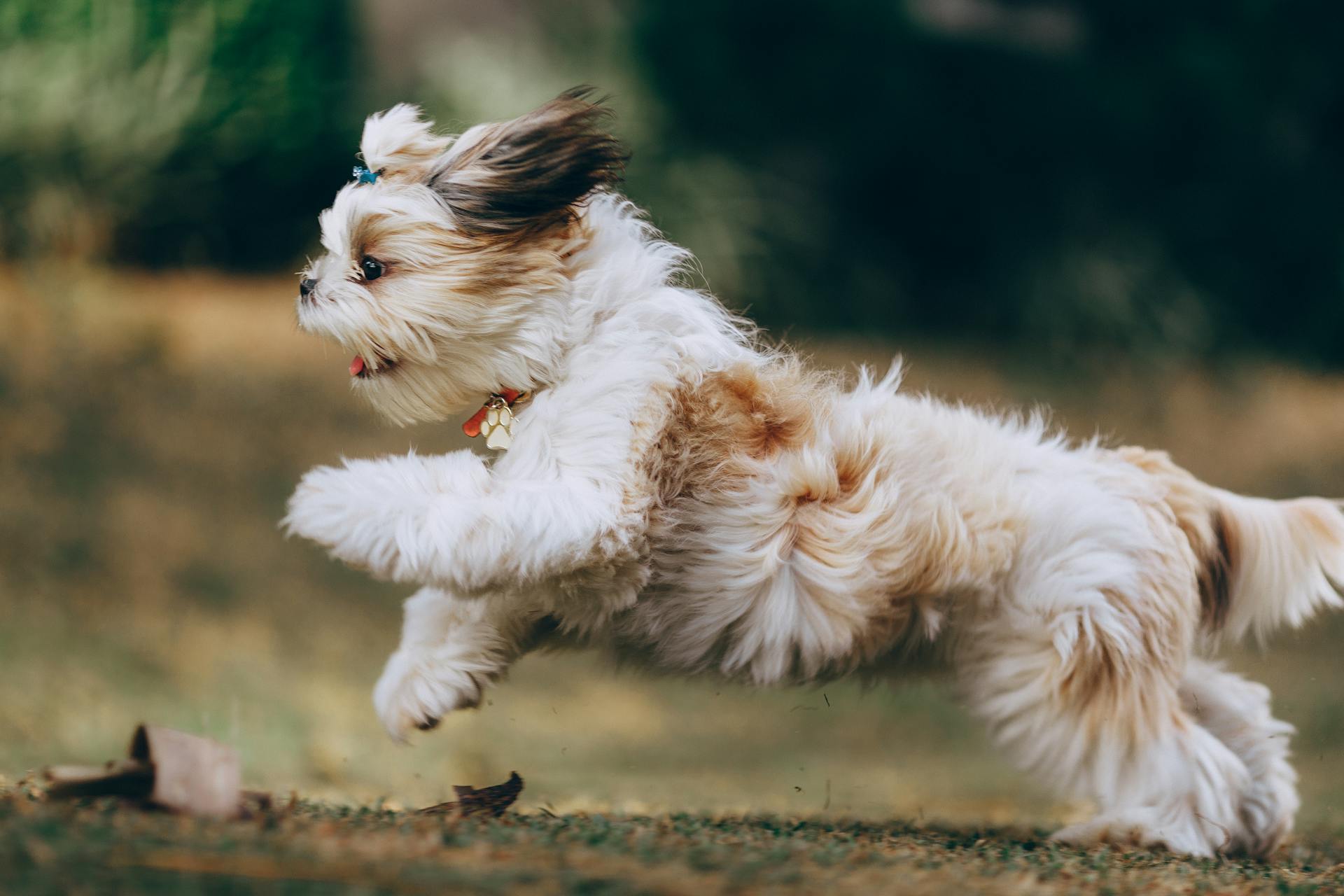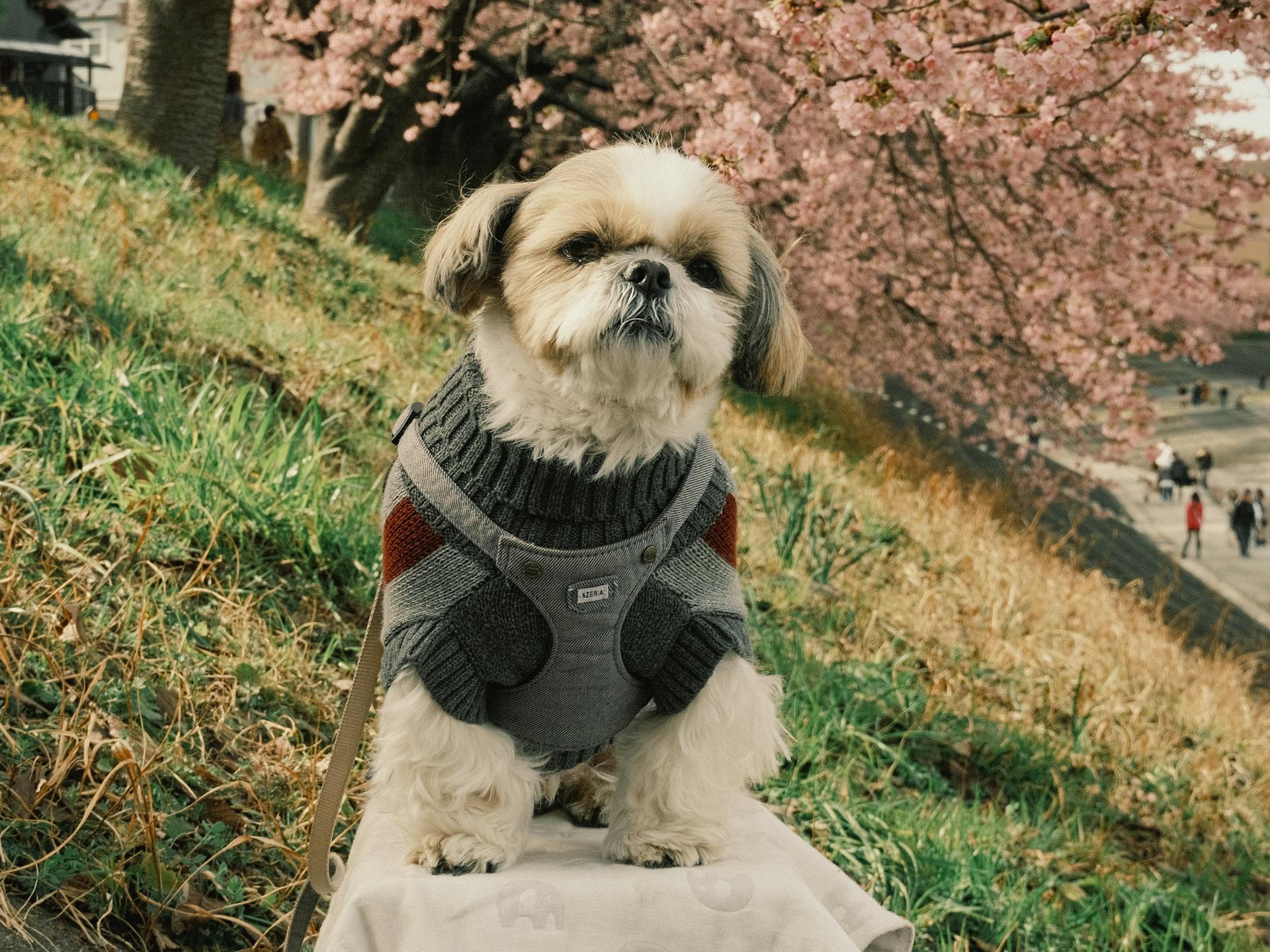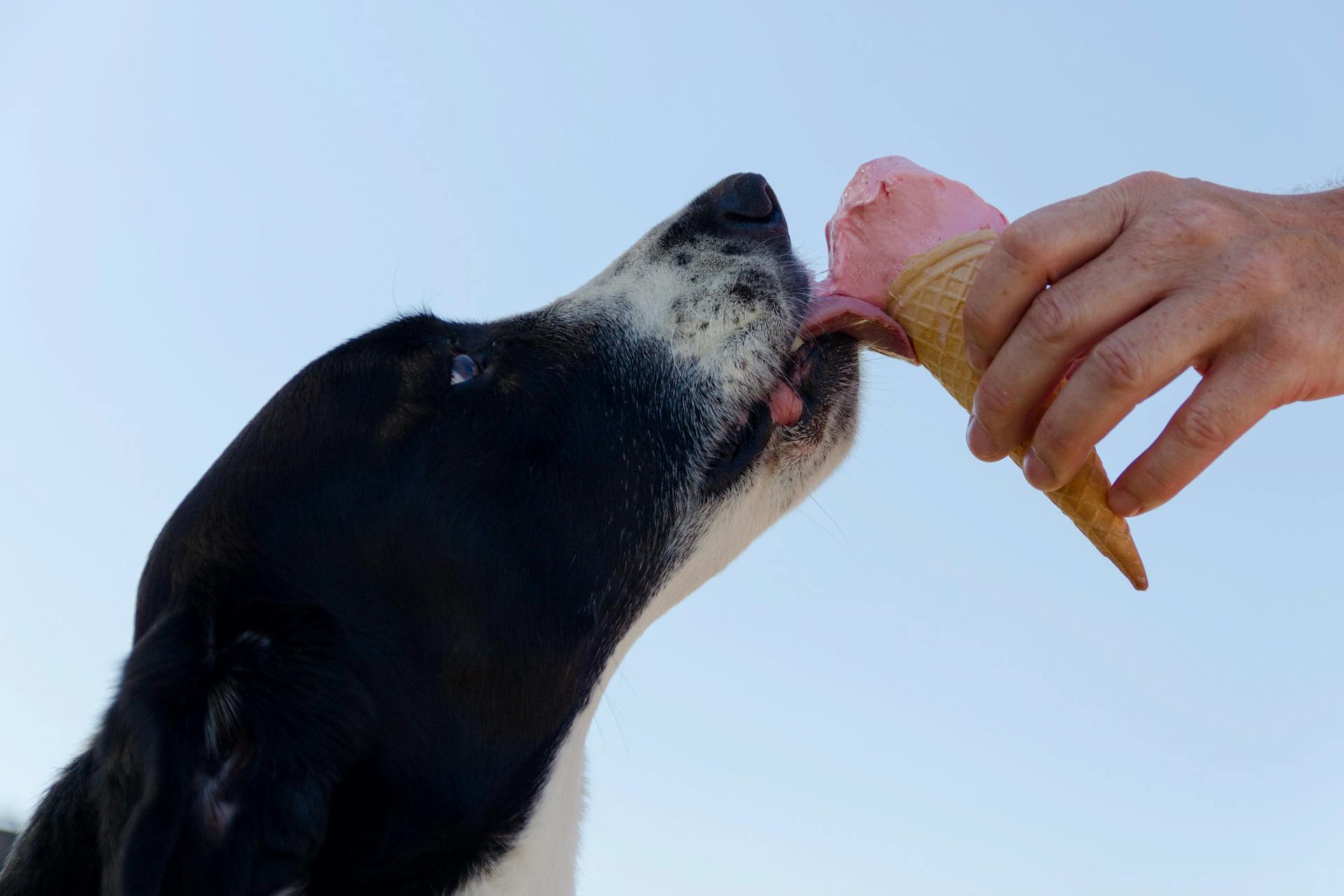
Shih Tzus are prone to breathing problems due to their flat face and short nasal passage. This can lead to respiratory issues, especially in hot or humid weather.
Their brachycephalic skull structure can cause their airways to become narrowed, making it harder for them to breathe. This is a common issue in many breeds with similar features.
Shih Tzus often experience respiratory distress, especially during exercise or in hot weather. This can be a serious issue, but there are steps you can take to help prevent it.
Regular exercise and a healthy diet can help keep your Shih Tzu's breathing problems under control.
Shih Tzu Breathing Problems
Shih Tzus are more prone to breathing problems, and it's essential to understand the reasons behind this. Biological traits make them more likely to have these issues.
Upper airway syndrome is a common problem in Shih Tzus, and it can be life-changing for your pet if left untreated. Airway surgery can provide relief.
Shih Tzus are more likely to have breathing problems due to their biological traits. This means their anatomy can make breathing more difficult.
If you suspect your Shih Tzu is suffering from upper airway syndrome, don't wait to schedule an appointment with a veterinarian.
Brachycephalic Syndrome
Brachycephalic syndrome is a breathing disorder in dogs with certain facial structures. It's a common issue in Shih Tzus due to their short muzzle and flat face. Symptoms include snoring, gagging, snorting, difficulty eating, sleeping, and exercising.
The syndrome is caused by anatomical abnormalities such as stenotic nares, elongated soft palate, hypoplastic trachea, and everted laryngeal saccules. These abnormalities restrict airflow, making breathing more difficult. The severity of symptoms may increase as the dog ages.
Dogs with brachycephalic syndrome may also experience respiratory distress, cyanosis (blue tongue or gums), and intolerance to exercise. Obesity can worsen symptoms, as well as heat and humidity. If you suspect your Shih Tzu has brachycephalic syndrome, consult with a veterinarian for proper diagnosis and treatment.
Causes and Symptoms
Brachycephalic Syndrome is a breathing disorder that affects dogs with certain facial structures. Dogs with short muzzles and flat faces, like Shih Tzus, are particularly susceptible to this condition.
Mildly affected dogs will have noisy breathing, especially with exercise, and most will snort when excited and snore when relaxed or asleep. Severely affected dogs have more pronounced airway noise, appear to tire easily with exercise, and may collapse or faint after exercise.
Noisy breathing is a common symptom of Brachycephalic Airway Syndrome, and it's often accompanied by other signs like gagging, retching, and vomiting. In fact, dogs with this syndrome may show signs including retching, vomiting, or lack of appetite.
The anatomical abnormalities that cause this syndrome include stenotic nares, an elongated soft palate, a hypoplastic trachea, and everted laryngeal saccules. These abnormalities can cause obstruction of airflow, leading to increased effort required to inhale.
Here are some of the common symptoms of Brachycephalic Airway Problems:
- Noisy breathing
- Excessive snoring
- Open mouth breathing (not panting)
- Frequent gagging or choking
- Intolerance to exercise
- Cyanosis (blue tongue or gums)
Obesity will make symptoms worse as well as heat and humidity, so it's essential to keep your dog cool and comfortable, especially during exercise.
Elongated Soft Palate
An elongated soft palate is a common issue in dogs with brachycephalic syndrome. This occurs when the soft part of the roof of the mouth is too long for the length of the mouth, partially blocking the entrance to the trachea.
Dogs with an elongated soft palate may exhibit symptoms such as snoring, gagging, and difficulty breathing. In severe cases, the soft palate can cause complete blockage of airflow.
Surgery is often the most effective treatment for an elongated soft palate. The excess tissue is removed under general anesthesia, which can greatly improve a dog's ability to breathe and prevent life-threatening heart and lung disease.
Here are some key facts about elongated soft palates in dogs:
- The soft palate is the flexible tissue toward the back of the roof of the mouth.
- An elongated soft palate can partially or fully block the windpipe in the back of the throat.
- Symptoms can range from mild to severe, including snoring, gagging, and difficulty breathing.
- Surgery involves resection (removal) of the excess tissue under general anesthesia.
- This surgery is often combined with stenotic nares surgery.
In dogs with brachycephalic syndrome, an elongated soft palate is a major cause of upper airway disease. It's essential to address this issue to improve a dog's quality of life and prevent long-term health problems.
Prevention and Care
Keeping your Shih Tzu's airways open is crucial to prevent breathing problems, so make sure your pet isn't overweight.
Maintaining a comfortable humidity level can alleviate some breathing issues. Putting a humidifier near your pup's sleeping area is especially beneficial.
To prevent overheating, keep your Shih Tzu indoors during the hottest days of the year and limit exercise as the temperature rises.
Treatment
Obesity can worsen the signs of brachycephalic airway syndrome, so weight loss is an important part of treatment if your dog is overweight.
Exercise levels need to be controlled, and your dog should avoid hot or humid conditions to manage the condition conservatively.
Corticosteroids, nonsteroidal anti-inflammatory drugs (NSAIDs), and oxygen therapy may provide short-term relief of airway inflammation or respiratory distress.
Surgery is the treatment of choice whenever the anatomic abnormalities interfere with the dog’s breathing.
Stenotic nares can be surgically corrected by removing a wedge of tissue from the nostrils, allowing improved airflow through the nostrils.
An elongated soft palate can be surgically shortened to a more normal length.
Everted laryngeal saccules can be surgically removed to eliminate the obstruction in the larynx.
Medical management of brachycephalic airway syndrome does not correct the underlying anatomical abnormalities.
For another approach, see: Shih Tzu Small Dogs
Prevention

To prevent breathing problems in your Shih Tzu, start by keeping them at a healthy weight, as excess weight can narrow their airways and exacerbate snorting.
Make sure your home is free from potential allergens like pollen, dust, and smoke, which can irritate your dog's airways and worsen breathing issues.
Dry environments can irritate your Shih Tzu's airways, so maintaining a comfortable humidity can alleviate some of the breathing issues. A humidifier near your pup's sleeping area can be especially beneficial.
Shih Tzus are prone to heatstroke, so keeping their environment cool will prevent them from overheating. Keep them indoors as much as possible during the hottest days of the year, and limit exercise even further as the temperature rises.
The position your Shih Tzu sleeps in can also be a factor, as they may find it easier to sleep on their side or on their front with a small pillow to prop up their chin and straighten out the airways.
Check this out: Average Weight of a Shih Tzu

Age and weight can also be factors in snorting, as Shih Tzus tend to gain weight as they age, which can further narrow their airways leading to increased snorting and difficulty breathing.
Limiting exercise is crucial, as the more you exercise your Shih Tzu, the higher their body temperatures get, making it more likely for them to suffer from heat stroke.
Additional reading: Shih Tzu Age
Right Sized Collar
A collar that is too tight can put extra pressure on your Shih Tzu's trachea. Shih Tzus are more likely to have narrower airways that are more prone to collapse, so it's crucial to get a collar that fits correctly.
To ensure your Shih Tzu's collar is not too tight, you can refer to a size chart or consult with a veterinarian to determine the right size. A collar that is too tight can cause discomfort and even lead to serious health issues.
A collar that fits correctly should be snug but not too tight. You can also consider using a breakaway collar to prevent accidents in case your Shih Tzu gets caught on something.
Expand your knowledge: Collar Size for Shih Tzu
Frequently Asked Questions
Why does my Shih Tzu sound like he's choking?
Your Shih Tzu may be hacking or making choking noises due to canine infectious respiratory disease complex (CIRDC), also known as kennel cough or canine infectious tracheobronchitis. Learn more about the symptoms and treatment options for this common dog illness.
Sources
- https://vcahospitals.com/know-your-pet/brachycephalic-airway-syndrome-in-dogs
- https://www.vet.cornell.edu/departments-centers-and-institutes/riney-canine-health-center/canine-health-information/brachycephalic-obstructive-airway-syndrome-boas
- https://www.pinecreekvet.com/services/airway-surgery
- https://www.dogster.com/dog-health-care/why-does-a-shih-tzu-snort
- https://www.dogster.com/dog-health-care/do-shih-tzus-have-breathing-problems
Featured Images: pexels.com


